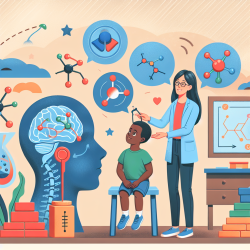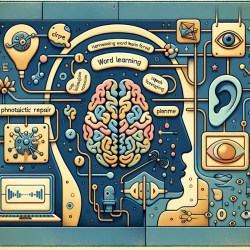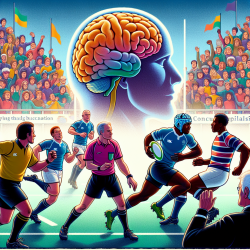Introduction
As a speech-language pathologist dedicated to evidence-based practice, understanding the latest research is crucial for enhancing therapeutic outcomes. A recent pilot study titled "Antagonism of NMDA receptors as a potential treatment for Down syndrome: a pilot randomized controlled trial" explores the effects of memantine, an NMDA receptor antagonist, on cognitive functions in individuals with Down syndrome (DS). This blog aims to summarize the findings and suggest ways practitioners can incorporate these insights into their practice.
Background and Study Overview
Down syndrome, the most common genetic cause of intellectual disability, often involves deficits in expressive language, memory, and other cognitive functions. The study, conducted by Boada et al., investigates the potential of memantine, a drug approved for Alzheimer's disease, to improve cognitive functions in young adults with DS. This research was inspired by preclinical evidence showing memantine's efficacy in a mouse model of DS, specifically the Ts65Dn mouse, which demonstrated improved learning and memory.
Study Design and Findings
The study was a 16-week randomized, double-blind, placebo-controlled trial involving 40 young adults with DS. Participants were divided into two groups: one receiving memantine and the other a placebo. The primary hypothesis was that memantine would enhance episodic and spatial memory, functions dependent on the hippocampus.
Although no significant differences were observed on the primary outcome measures, the memantine group showed significant improvement on a secondary measure related to episodic memory, specifically the California Verbal Learning Test-II (CVLT-II). This suggests potential benefits of memantine in specific cognitive domains, warranting further investigation.
Implications for Practitioners
For speech-language pathologists and other practitioners working with children with DS, these findings offer several insights:
- Targeted Interventions: The improvement in episodic memory suggests that interventions focusing on memory enhancement could be beneficial. Incorporating memory strategies and exercises into therapy sessions might amplify cognitive gains.
- Monitoring and Adaptation: Given the variability in response, practitioners should closely monitor individual progress and adapt interventions to maximize benefits.
- Collaborative Care: Engage with medical professionals to discuss the potential use of memantine as part of a comprehensive treatment plan, especially for clients showing specific memory deficits.
Encouraging Further Research
While this study provides promising insights, it also highlights the need for further research. Larger sample sizes and longer study durations could provide more definitive conclusions. Practitioners are encouraged to stay informed about ongoing research and consider participating in studies to contribute to the growing body of knowledge.
Conclusion
The study on NMDA receptor antagonism offers a glimpse into potential therapeutic avenues for enhancing cognitive functions in individuals with DS. By integrating these insights into practice, speech-language pathologists can contribute to improved outcomes for their clients. To read the original research paper, please follow this link: Antagonism of NMDA receptors as a potential treatment for Down syndrome: a pilot randomized controlled trial.










